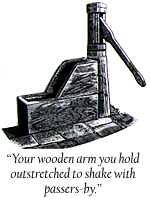Main Menu · Search ·Current Issue ·Contact ·Archives ·Centennial ·Letters to the Editor ·FAQs


"Harvard's award of an honorary degree to Nelson Mandela was by all accounts a stirring and memorable occasion. But media coverage reported the speakers' misapprehension of the historical context. President Mandela's degree, described as only the third the University has granted to a single individual outside of Commencement, was in actuality the twelfth such degree that Harvard has conferred."
 After the ceremony, hundreds cheered as Prince Henry and Eliot entered the Yard in a carriage. Harvard University Archives |
So wrote John T. Bethell '54, former editor of Harvard Magazine and author of the history Harvard Observed, in a letter published in the Boston Globe in October and noted in the November-December 1998 issue of this magazine. Bethell continued, setting the record straight:
"As reported, special academic ceremonies were held to honor George Washington (April 1776) and Winston Churchill (September 1943). Individual pre- sentations in earlier centuries were also made to the Marquis de Lafayette (October 1784), President James Monroe (July 1817), and President Andrew Jackson (June 1833).
"Honored singly in this century were Albert William Henry, prince of Prussia (March 1902); Joseph Joffre, marshal of France (May 1917); Albert-Leopold Clement Marie, king of Belgium (October 1919); Joseph Cardinal Mercier, primate of Belgium (October 1919); Ferdinand Foch, marshal of France and of Great Britain (November 1921); Gustaf Adolf, crown prince of Sweden (July 1938), and Prime Minister Churchill.
"All received the degree of doctor of laws. The records of the University Archives will verify this listing.
"Acknowledging these occasions, exceptional events in their time, surely takes nothing away from the importance or dignity of the award to President Mandela," Bethell concluded.
Of the eight special presentations in this century, the awards to the king of Belgium and the crown prince of Sweden were made in relatively small academic meetings in the Faculty Room of University Hall. The others involved full-dress convocations at Sanders Theatre. Marshal Joffre went on to appear before a crowd of 22,000 at Harvard Stadium. Processing from Sanders, Foch received a 19-gun "general's salute" from a battery of four guns on the steps of Widener Library.
Visual records of these early-twentieth-century conferrals are scarce. The photo op had not yet come to Cambridge. But Archives staff were able to unearth the photograph shown here of the prince and the prexy.
In 1902 Professor Kuno Francke was seeking support for a Germanic
museum. Kaiser Wilhelm II was happy to help. Germany had been
doing its best to win friends in the United States. Prince Henry
arrived at Harvard in March to announce a gift of Teutonic artworks
assembled by order of his brother the kaiser. Harvard's governing
boards had voted to honor the prince with an LL.D. President Charles
W. Eliot, who disliked
the militarism and social rigidity of imperial Germany, was a
reluctant participant in the event.
Eliot opened the ceremony by saying that "twice in the history of the University has a special academic session been held to do honor to the President of the United States, making a progress through the country; but never before has this democratic University been called together on purpose to do honor to a foreign prince. Weighty reasons must have determined such unprecedented action on the part of this society of scholars."
As Professor Adams Sherman Hill put it, Eliot "froze to the occasion."
Harvard unveiled a plaque in the Widener Library reading room on November 6 naming the space the Loker Reading Room. The gesture honors Katherine B. Loker, who has given $14 million to help rehabilitate the library's stacks (July-August 1998, page 67). Among the speakers at the ceremony was Jeremy R. Knowles, dean of the Faculty of Arts and Sciences. He referred to a requirement in the Laws of Harvard College of 1816 that all the books in the library be dusted before the annual inspection tours by the visiting committee of the Board of Overseers. In 1816, such a chore, performed by a diligent duster at a rate of five books a minute, would have taken about a week; today it would take 23 years.
Nancy Cline, Larsen librarian of Harvard College, confirms that "the library actually used to call in all the books for the annual inventory, and that was when the dusting occurred. Whew!" says Cline. "Glad that's history!"
~Primus V